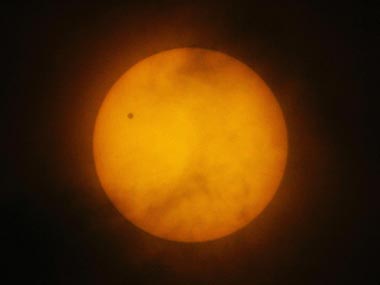People across India flocked to catch the transit of Venus, the largest celestial event likely to occur in our lifetime.
In Delhi public viewings of the rare occurrence, which will not happen again until 2117, were organised at the Nehru Planetarium with telescopes and solar filters put up at Teen Murti lawns in Chanakyapuri in the national capital.
“I was awestruck. It was a special moment that I will never forget in my life,” said Ramandeep Singh, a Class Nine student of Gyan Mandir Public School in west Delhi.
Science Popularisation Association of Communicators & Educators (SPACE), an organisation working to spread awareness about astronomy, took 50 students to Shanghai, China, to observe the transit, where it was visible for the longest time.
In Chennai the Birla planetarium hosted thousands of interested and enthusiastic sky gazers. “Over 5,000 people might have come and gone after seeing the celestial event here since morning. We made arrangements for the people to view the event thorough different telescopes,” S. Soundarajaperumal, joint director, Birla Planetarium told IANS.
Special arrangements were made for the people to watch the transit of Venus as watching it with naked eyes is injurious.
“While the school students enjoyed watching the event, Madras University students are doing their research,” Soundarajaperumal said.
People were also keen in viewing the visible sun spots.
According to scientists, transits of Venus occur only on very rare occasions when Venus and the Earth are in a line with the Sun. At other times, Venus passes below or above the Sun because the two orbits are at a slight angle to each other.
Transits occur in pairs separated by eight years, with the gap between pairs of transits alternating between 105.5 and 121.5 years - the last transit was in 2004.
In Kerala however, the event turned out to be a no-show as the monsoon rains took centrestage, leaving hundreds of school children disappointed.
The Priyadarshini Planetarium in the heart of the city was abuzz with activity as hundreds of school children turned up to witness the rare spectacle at 6.30 a.m. Their excitement, however, soon turned into disappointment because of the rain.
“We are really disappointed with what happened today (Wednesday). The rain played spoilsport,” said a disappointed student.
“We saw Venus as a black spot on the telescope with rear projection screens,” added the student.
IANS


)




)
)
)
)
)
)
)
)